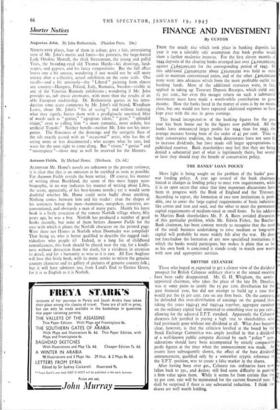FINANCE AND INVESTMENT
By CUSTOS
FROM the steady rise which took place in banking deposits last year it was a tolerably safe assumption that bank profits would show a further moderate increase. For the first. eleven months of 1944 deposits of the clearing banks averaged just over £4,104000,000, against £3,65o,000,000 for the corresponding period of 1943. Of this additional £45o,000,0oo about £5o,000,000 was held as extra cash to maintain conventional ratios, and of the other £400,000,00o none went into advances which form the most profitable outlet for banking funds. Most of the additional resources were, in fact, applied in taking up Treasury Deposit Receipts, which yield only If per cent., but even this meagre return on such a substantial investment must have made a worth-while contribution to gross income. How the banks fared in the matter of costs is by no means clear, but one would not have expected additional expenses to have kept pace with the rise in gross earnings.
This broad interpretati.m of the banking figures for the past year has been borne out by the figures now published. All the banks have announced larger profits for 1944 than for 1943, the average increase having been of the order of 44 per cent. True to their conservative tradition, the bank directorates have not seen fit to increase dividends, but have made still larger appropriations tl published reserves. Bank shareholders may feel that they are being denied a substantial part of what is legitimately theirs, but sooner or later they should reap the benefit of conservative policy.
THE BANKS' LOAN POLICY
More light is being sought on the problem of the banks' post- war lending policy. A year ago several of the bank chairmen hinted at changes in lending policy to meet rew requirements, while it is an open secret that since that time important. discussions have been in progress with the Bank of England and the Treasury. According to report, the formation of two new institutions is prob- able, one to cover the large capital requirements of basic industries like cotton and iron and steel, and the other to meet the permanent capital requirements of medium-sized or small firms. In his address to Martins Bank shareholders Mr. F. A. Bates avoided discussion of this particular problem, while Mr. Edwin Fisher, the Barclays Bank chairman, has been content merely to recognise that the need of the small business undertaking to raise medium or long-term capital will probably be more widely felt after the war. He does not foreshadow the formation of any new specialised institutions in which the banks would participate, but makes it plain that so far as his own bank is concerned it stands ready to match new wants with new and appropriate services.
BRITISH CELANESE
Those who hoped or,expected to get a clearer view of the dividend prospect for British Celanese ordinary shares at the annual meeting have been sadly disappointed. Mr. G. H. Whigham, the newly- appointed chairman, who takes the place of the late Dr. Dreyfus, was at some pains to justify the 15 per cent. distribution for the past financial year, but did not attempt to build up a case that would put the is per cent. rate on any firm basis. On the contrary, he defended this over-distribution of earnings on the ground that, taking the years 1942-43 and 1943-44 together, aggregate earnings on the ordinary capital had amounted to something over 23 per cent., allowing for the adjusted E.P.T. standard. Apparently the Celanese directors felt justified in paying a high rate to shareholders who had previously gone without any dividend at all. What does become clear, however, is that the criticism levelled at the board by the Stock Exchange Committee was amply justified in that a dividend of a well-known public company dictated by such " policy " con- siderations should have been accompanied by strictly comparable profit figures at the time when the announcement was made. As events have subsequently shown, the effect of the bare dividend announcement, qualified only by a somewhat cryptic reference to the E.P.T. position, was to create a false market in the shares.
After having been over 4os., Celanese ios. ordinaries have now fallen back to 35s., and dealers still find some difficulty in putting a firm value upon them. While it seems far from certain that the 15 per cent. rate will be maintained for the current financial year. I shall be surprised if there is any substantial reduction. I think the shares are well worth holding.


























 Previous page
Previous page